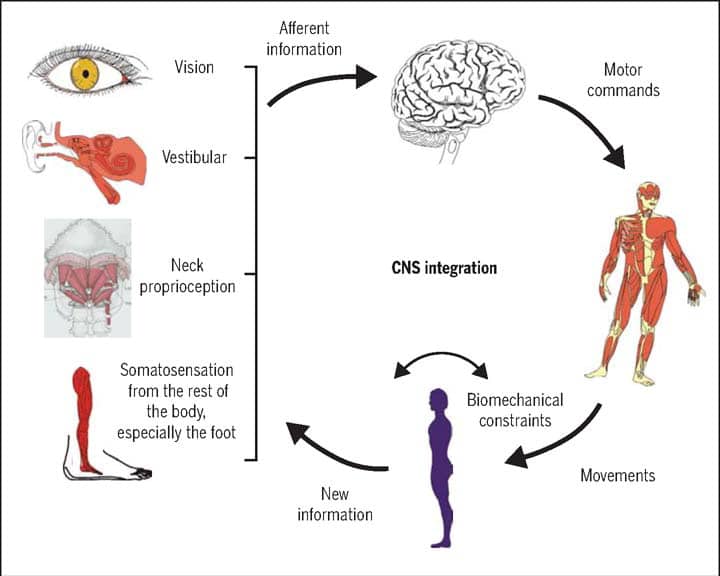How can your Neck Pain cause Dizziness?
Have you noticed that whenever you have some pain in your neck that you also feel a little bit light-headed or unsteady? You are not alone. It turns out those feelings of being lightheaded and unsteady are common with Neck Pain and might actually be caused by your neck!
Yes, you read that right!
The dizziness can be caused by your neck. The formal name for this is called “cervicogenic dizziness” and simply means dizziness coming from the spine. A question you might be asking is “how could your neck possibly cause dizziness?”
Cervicogenic Dizziness
Each of the muscles, joints, ligaments around your neck help with proprioception. Proprioception is the ability for your body to detect where you are in space.
Your head relies on the feedback from your vision, vestibular system, and the proprioceptors (position sensors) in your neck to detect where your head is and its relationship to gravity in 3-dimensions. If there is a mismatch of information between your vision, vestibular system, and neck, your brain loses its orientation in space, which results in you feeling dizzy.
Viola-you have an information mismatch that is called “cervicogenic dizziness.”
How to know if you have cervicogenic dizziness?
The first step is to make sure you do not have any disorder that also causes dizziness, as there are some other conditions that can closely resemble cervicogenic dizziness. Some other causes of dizziness can be your vestibular system (your inner ear) or impairments in your autonomic nervous system. Impairments in your autonomic nervous system can result in sudden changes in blood pressure or heart rate, which lead to dizziness. Impairments in your vestibular system can be the result of BPPV, Meniere’s disease, or any other dysfunction in your inner ear. As physical therapists, we can do specific tests to rule out any of those other conditions that can result in dizziness.
Symptoms of cervicogenic dizziness
The next step is to make sure your symptoms align with cervicogenic dizziness. People who are experiencing cervicogenic dizziness typically have dizziness that is episodic, lasts minutes to hours, and occurs with movements of the neck. If those symptoms match with what you are feeling, then you likely are experiencing cervicogenic dizziness and should come in to see us at Lifestrength or another physical therapist in your area.
How can physical therapy help cervicogenic dizziness?
The first step is to improve any stiffness in your neck that may result in altered feedback to your brain. We typically do manual therapy, prescribe stretches, and light exercises that target improving your range of motion. Next we will focus on improving the strength and control of the muscles around your neck, which can improve coordination of your neck. Finally, we will use many different exercises to improve your balance and eye-head coordination. These types of exercises help give your brain matching feedback from your eyes and muscles around the neck, reducing dizziness.
Summary- cervicogenic dizziness
As explained above, cervicogenic dizziness can come from a myriad of smaller inputs -neck joints, vestibular system, eye tracking, and even your foot sensation. Because of these complicated interactions, it is best to seek advice from a PT who understands this condition and can help to direct your recovery.
If you are experiencing any of these symptoms, please give us a call so we can get you on the right track. While cervicogenic dizziness is common, it should not get in the way of doing the things you love.
References:
Kristjansson, E., & Treleaven, J. (2009). Sensorimotor function and dizziness in neck pain: Implications for assessment and Management. Journal of Orthopaedic & Sports Physical Therapy, 39(5), 364–377. https://doi.org/10.2519/jospt.2009.2834
Jung, F. C., Mathew, S., Littmann, A. E., & MacDonald, C. W. (2017). Clinical decision making in the management of patients with cervicogenic dizziness: A case series. Journal of Orthopaedic & Sports Physical Therapy, 1–42. https://doi.org/10.2519/jospt.2017.7425
Archives
- March 2024
- February 2024
- January 2024
- October 2023
- September 2023
- April 2023
- December 2022
- November 2022
- October 2022
- August 2022
- July 2022
- June 2022
- May 2022
- March 2022
- January 2022
- April 2021
- February 2021
- January 2021
- September 2020
- August 2020
- July 2020
- June 2020
- April 2020
- January 2020
- September 2019
- June 2019
- May 2019

